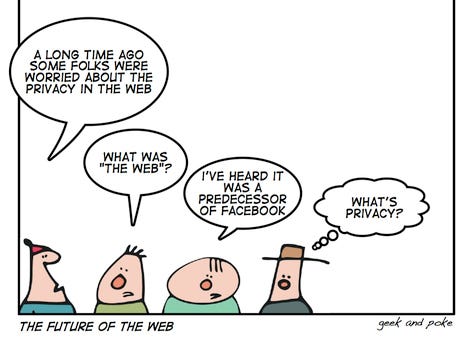Bitcoin's Political Moment Has Arrived. Bitcoin Tech Talk #252
The infrastructure bill has a Bitcoin clause in it and the clause has absolutely blown up. The particulars of the clause and the various amendments themselves are significant and interesting, but that’s not what I’m writing about today. What has been the more intriguing development has been the Bitcoin community’s influence.
The whole business of politics and legislation is really gross and disgusting, often compared to sausage-making. That process usually involves a lot of lobbying and amendments and negotiation, which we’ve seen on Twitter the last week or so. All of this doesn’t usually kick off without some significant lobbying, and boy are we seeing that here.
The single Bitcoin provision already has three amendments proposed to it already, including one to strike it entirely. This does not come about without some threat behind it and what this week has shown is that Bitcoiners really do care about the issue. But then again, this has always been the case. Even back in 2011, Bitcoiners cared deeply about the regulatory environment and many back then were trying to get clarity.
What’s changed now is the sheer number of people involved. 4 years ago, Bitcoin investors consisted of 2% of the investing class and now we’re at 6% and poised to grow. Some estimate that 40M Bitcoiners are in the US, with higher concentrations around younger voters. For politicians looking to the future, it makes sense to pay attention to this demographic.
In addition, there are many other reasons for politicians to woo this demographic. Many in Bitcoin couldn’t care less about politics, so they may very well convert to single-issue voters. Bitcoiners also have a good deal of money, which is something every politician needs. Finally, Bitcoiners have low time preference, meaning that they’re going to have some long memories and not let politicians get away with betrayal very easily. Politicians may score points by voting against the interests of the Bitcoin community in the short term, but they’re likely to suffer long term if they oppose Bitcoin for too long.
This is bad news for politicians like Elizabeth Warren, who seem to be positioning themselves squarely against Bitcoin’s ability to provide savings technology to the very people they purport to represent. By the time Warren’s up for reelection in 2024, will this be enough of an albatross around her neck to get her primary’d in a heavily Democrat-leaning state? We shall see.
Regardless, we’ve hit a cultural moment where Bitcoin is flexing its muscles politically. This isn’t some brief encounter, but one I expect will last a long time.
Bitcoin
Andrew Poelstra and Russell O’Connor have written up how they implemented Schnorr signatures using Simplicity. The article is informative, not just to understand that Simplicity really is a great smart contract language, but about the limitations of the current Bitcoin Script. Specifically, the limitations around what’s getting signed still plagues the network with ANYPREVOUT, being one of the ways to expand it. As they show, Simplicity allows signature modes that are way more flexible. I applaud their efforts to bring a better smart contract language to Bitcoin, essentially written from scratch. It will be interesting to see if it’s used in the way they imagine on Liquid.
Samourai Wallet has started a series on understanding privacy on the Bitcoin network. The article is great as an overview of what trackability is, with concrete examples of UTXOs being used to trace the spending patterns of a particular user. Then they explain CoinJoins and how this defeats the tracing. Part 2 covers more advanced concepts like external transaction data, graph analysis and wallet clustering. Overall, the articles are a good primer on some privacy issues that wallet developers and users should think about.
CoinOS is an app for doing Bitcoin payments over Bitcoin, Lightning and Liquid. The project looks like an interesting self-hosted way of doing payments back and forth.
Lightning
Kevin Rooke shows how the Lightning Network is probably bigger than you think. Essentially the argument comes down to the fact that much of what’s on lightning is data that’s hard to collect and therefore much more private than on-chain transactions. There’s probably more capacity and channel activity than we know about because much of it can be hidden from the services that collect such data. This was a good reminder that the stats that we see online about LN are only a portion of what’s really going on.
Agora is a file server where you can host files and charge for file downloads. By default, the service doesn’t charge anything, but you can hook it up to a Lightning node and charge sats for downloads. This is a really cool project that I think needs incorporation into the decentralized web in general. Upload bandwidth is not free and charging for that would be very useful to defray server costs.
Jameson Lopp gives advice on LN liquidity management. His advice in the article is counterintuitive but sound. Don’t just connect to the big nodes that everyone else is connecting to and instead focus on creating new bridges on the network to really earn fees. As he notes, this is a competitive market and innovation on figuring out where to connect is bound to appear. There’s probably money in there for you if you can figure out the most desired routes to create.
Umbrel has released a new version of its personal server software. Not only do Umbrel servers have Bitcoin and Lightning software installed, but they’re expanding their servers with photo hosting and torrenting. I would love to see a personal mail server, calendar server and the like to reduce dependence on centralized walled gardens like Google’s. The decentralized web is coming and companies like Umbrel are making it happen.
Economics, Engineering, Etc.
SEC Chairman Gary Gensler has made a surprisingly accurate speech about Bitcoin and how the SEC will be treating it. He certainly seems to have a lot of respect for Bitcoin and has hinted that there’s a lot of scamming in the altcoin space. I’m optimistic that he’ll be cleaning out the cesspool of fraud that is altcoining. This should be relatively easy since altcoins are so obviously centralized.
Tomer Strolight shows how Ethereum is really not different than Central-bank backed fiat money. The analogies are sound and for people that tend to lump together “cryptocurrency” and think they’re variations of the same thing, this article exposes Ethereum for what it is. Ethereum really has central controllers, the Cantillon winners and the public from which it extracts value. Good to send to your ETH-confused friends.
In a similar vein, Alex Svetski gives a thorough analysis of Why Bitcoin and not S*itcoin. This is a more thorough article with a devastating takedown of altcoins. This distinction is very important because Bitcoin is lumped together in the “cryptocurrency” space usually under the banner of innovation. As Alex points out, the savings aspect and store of value is what makes Bitcoin what it is and he emphasizes the importance of savings going forward.
Jameson Lopp has the results from altcoin node sync tests. The results weren’t good. Ethereum has bloated significantly in the past couple of years and a full archival node require 8TB of space! Other altcoins are also clearly not engineered very well and usually have clear bottlenecks that their devs are either ignoring or are incapable of fixing. Honestly, it’s surprising to me how few people seem to be able to distinguish technological garbage like the software he examined versus something well engineered, like the Bitcoin Core software.
Fluffypony, long-time maintainer of Monero, has been arrested. This has to do with something he did before Monero, but it’s hard not to suspect that there’s another agenda in this given that the amounts are a pittance to a very rich man like him. I expect a lot more prominent altcoiners to start getting in trouble given the many sketchy things they’ve been doing over the past 10 years.
Quick Hits
Bitcoiners should really consider moving to Austin.
Breedlove apologizes about Bitclout.
Another week, another altcoin suffers an attack.
Another month, another exchange operator exit scams.
Events
I will be at The Bitcoin Standard conference this week on August 12-14 in Ensenada, Mexico, BitBlockBoom in Dallas on August 26-29, Token 2049 in London, England on October 8-9 and in Atlanta for TabConf on November 4-5.
The Programming Blockchain seminar is in Mexico on August 10-11, London on October 9-10 and Atlanta on November 2-3. This is a 2-day seminar for programmers to learn about Bitcoin. You can apply here. I also have a few scholarships available for those that can’t afford it.
Podcasts, Etc.
On this week’s Bitcoin Fixes This, I talked to Jason Les about his fascinating journey to become CEO of Riot Blockchain, the mining industry and how it’s helping poor communities. I read through last week’s newsletter which you can find here.
I was on Tone’s show to talk about Fluffy’s arrest, ETH politboro’s latest and much more.
I talked about the new book with Blue Collar Money and Biblical Wealth Podcast:
Unchained Capital is a sponsor of this newsletter. I am an advisor and proud to be a part of a company that’s enhancing security for Bitcoin holders. If you need multisig, collaborative custody or bitcoin native financial services, learn more here.
Fiat delenda est.







![E[Optimism]: Do you have change for used gum? E[Optimism]: Do you have change for used gum?](https://substackcdn.com/image/fetch/$s_!N1n_!,w_1456,c_limit,f_auto,q_auto:good,fl_lossy/https%3A%2F%2Fbucketeer-e05bbc84-baa3-437e-9518-adb32be77984.s3.amazonaws.com%2Fpublic%2Fimages%2F4e3e7596-e75a-4a1b-ab94-dd4ac8a4b4ae_640x199.gif)




